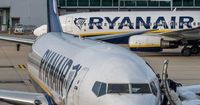Ryanair is urging travelers to be proactive about their luggage preparations as updated regulations come into effect ahead of the busy spring and summer vacation season of 2025. The budget airline, which is renowned for its stringent luggage rules, has specifically highlighted the need for caution among passengers traveling with medications and prescriptions.
Passengers are advised to pay close attention to the airline's enhanced baggage policies, particularly in relation to carrying medical equipment. Prior to boarding, anyone intending to bring a defibrillator must obtain a medical equipment baggage waiver letter from Ryanair. This letter must be presented at the bag drop desk or the boarding gate, especially for those without checked baggage. Additionally, a 'fit to fly form' is required to comply with regulations on the day of travel.
Ryanair's website states that passengers can carry an array of medical items including EpiPens, capsules, tablets, pills, liquid medications (such as syrups or drops), inhalers, topical medications like creams or gels, and diabetic supplies within their cabin baggage. The airline further assures that syringes can be brought on board for medical needs, particularly for diabetic passengers. However, they must possess a doctor's letter confirming the necessity of such items, as highlighted by Birmingham Live.
Additionally, Ryanair has warned that staff may be required to open containers to screen liquids at security checkpoints, emphasizing the importance of ensuring all necessary items are readily accessible for screening. Screening procedures for medical equipment are notably stringent, reflecting a commitment to both safety and passenger convenience.
According to Ryanair, certain medical items such as Portable Oxygen Concentrators (POC) that meet regulatory requirements are approved for use on board. Other medical devices, including CPAP or Portable Dialysis machines, can be carried but are not permitted for use during flights. This information comes as the airline prepares to accommodate a surge in holiday travelers seeking great deals.
One key point outlined by Ryanair regarding carrying a defibrillator is that it requires not just the waiver letter but also the fit to fly form to ensure compliance with both airline and aviation regulations. Passengers must be well-prepared if they wish to bring or utilize special medical items on their journey. The company further noted that medical equipment can be carried free of charge, in addition to the permitted small personal bag, although this is strictly contingent on pre-clearance by the Special Assistance Team.
In order to determine if requests to carry medical items can be approved, travelers need to contact Ryanair's Special Assistance Team ahead of their travels. This means good communication and planning are essential components of a successful travel experience for passengers with special medical needs, as Ryanair continues to navigate the challenges posed by travel regulations globally.
While Ryanair maintains its position as a low-cost carrier, often competing with the likes of Jet2, TUI, and EasyJet, the airline underscores the importance of awareness among its customers about new luggage protocols that have become increasingly complex due to heightened security measures. As such, Ryanair's call for careful preparation allows travelers to focus on their vacation plans rather than worry about airport procedures.
In a market defined by competitive pricing and service offerings, Ryanair’s announcements serve as a reminder to passengers to remain informed and prepared when flying, particularly those on medication or with specific medical requirements. With the right planning, passengers can avoid unnecessary stress at the airport and enjoy their upcoming travels.





